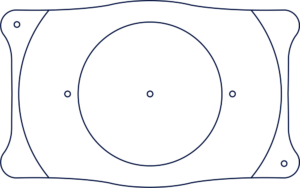![]() Take the Next Step. Request a Surgical Consultation.
Take the Next Step. Request a Surgical Consultation.
Not a candidate for LASIK eye surgery? The truth is that there is no one-size-fits-all vision correction option. It is true, however, that there is usually a vision correction procedure that offers the best possible vision for you. With today’s laser treatment and lens technology, you don’t have to struggle with the possibility of settling for the second-best option.
With the right experts, you can experience the best vision correction surgery perfectly suited for your individual needs.
PRK (Photorefractive Keratectomy)
PRK is similar to LASIK but it corrects different parts of the cornea, leaves no permanent corneal flap, and may have a slightly longer recovery period. PRK procedure provides an alternative for patients whose corneas are too thin for LASIK and may also be an option for patients with dry eyes or diseases of the corneal surface.
What Is PRK?
PRK (photorefractive keratectomy) is a laser eye surgery that reshapes the cornea so the light entering the eye is focused on the retina to produce clear images.
How Does PRK Work?
During PRK surgery, the cornea’s outer layer (called the epithelial flap) is removed entirely to expose the area, whereas, in LASIK, a thin, hinged flap is created in the cornea. For both PRK and LASIK, the excimer laser is used to sculpt the cornea and correct the refractive error. A soft bandage contact lens is then placed on the eye to let the cornea heal.
The PRK surgery time is usually about 10 minutes per eye and typically results in 20/20 vision. PRK recovery time can vary from several days to several weeks.
Implantable Contact Lens – EVO Visian ICL
For those who are not ideal candidates for LASIK; there’s a possibility of even better vision with ICL.
Implantable Collamer Lens, also often referred to as implantable contact lenses, were introduced a few decades ago as an astounding leap forward in refractive surgery. For the first time, people with exceptionally high lens prescriptions (high myopia) and those who lack sufficient corneal thickness to have LASIK could improve their vision. Today’s ICL procedure has the revolutionary ability to deliver the results of that surgery but in a procedure that takes 15 to 30 minutes to complete. Most patients see an improvement in eyesight immediately.

How Does EVO Visian ICL Work?
Collamer is a technologically advanced lens material that’s 100% compatible with your body’s chemistry, meaning it’ll be comfortable and you won’t feel it in your eye. Made of mostly water and collagen, the natural design of Collamer is an outstanding refractive surface that remains quiet in the eye, even repelling substrates that might otherwise collect on its surface. Implantable Collamer Lenses also offer anti-reflectivity and UV protection.
How Safe Is EVO Visian ICL?
We consider a procedure safe if it is statistically on par with or safer than contact lenses. EVO ICLs have fewer infections per decade than are associated with contact lenses per month.
Am I a Candidate?
EVO Visian ICL can often correct the eyesight of those who can’t undergo LASIK because of thin corneas, dry eyes, or unusually high refractive errors. If you fit the criteria below, you’re most likely a candidate for EVO Visian ICL:
- Between 21 and 45 years old
- Nearsighted
- No change in eyeglass prescription of more than 0.5D in a year
- Not pregnant
- Have thin corneas and dry eyes
- Have low and high refractive errors (as low as -3D to as high as -20D prescription)
Refractive Lens Exchange (RLE)
Refractive Len Exchange (RLE) is an effective LASIK alternative that could be a suitable option for you. While natural vision changes are inevitable, with today’s advanced technology, our surgeons can:
- Stop the progression of dysfunctional lens syndrome
- Reduce or eliminate your dependency on glasses, bifocals, and/or readers
- Prevent you from developing a cataract
Who Is a Candidate for RLE?
RLE is an excellent solution for someone who is experiencing one or more of the following common visual changes:
- Difficulty reading without reading glasses or bifocals
- Difficulty seeing near objects
- Difficulty seeing while driving, especially at night
- Changing glasses prescriptions
- Diagnosis of early cataract formation
- High degree of farsightedness (hyperopia)
During your consultation, our surgeon will be able to assess if this is the best procedure for your eyes. Refractive lens exchange is a lifestyle choice to bring your normal activities into focus. Our refractive lens specialists will choose the lens that is right for you and that will best achieve your vision goals.
Clear Lens Exchange vs. Lasik
Lasik is a popular option for people with poor eyesight that no longer want to use glasses or contact lenses. Unfortunately, LASIK is not an option for everyone because there are certain things such as corneal thickness and eye dryness that can prevent you from getting LASIK procedures.
Clear lens exchange, or refractive lens exchange, has a wider amount of people that can successfully go through the procedure. The refractive lens exchange simply allows an artificial lens to replace your natural lens. The procudure takes about 30 minutes and 12 weeks to heal fully.
Both are outpatient procedures and have high success rates.
Call (301) 591-1763 for information regarding the pros and cons of LASIK vs. clear lens exhanges!
Request a Surgical Consultation
The first step in determining your candidacy for any procedure is to schedule a consultation and experience our comprehensive eye exam. Utilizing advanced diagnostic technology, our surgeons will not only evaluate your candidacy for a procedure but will look at the overall health of your eyes and establish a long-term plan for your best vision.
If you are a current patient and/or have a medical concern or question, please contact us directly at (301) 591-1763.
